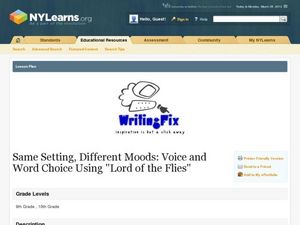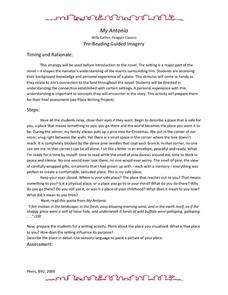K20 LEARN
Brushstrokes: Communication/Using Descriptive Language
Sometimes a picture reflects a thousand descriptive words. To illustrate the importance of sensory words in descriptive writing, scholars listen to a song and craft a painting in response. After sharing their work with the class,...
Curated OER
Same Setting, Different Moods: Voice and Word Choice Using Lord of the Flies
Whether it's dark, delightful, or somber, set the mood with William Golding's Lord of the Flies. High-schoolers practice descriptive writing by creating the appropriate mood for an original scene, starring one of the book's main characters.
Curated OER
Choosing Words Carefully
Use literacy tools to select precise vocabulary. High schoolers respond to discussion questions that require them to consider the denotation and connotation of words. They then read non-fiction passages and identify words in the passages...
Curated OER
The Use of Language in "I Know Why the Caged Bird Sings"
Readers of I Know Why the Caged Bird Sings are asked to craft an essay in which they compare how Maya Angelou uses figurative language to depict herself and Mrs. Flowers.
K20 LEARN
Texture Poetry: The Great Gatsby and the Sense of Touch
To prepare for crafting a descriptive poem about a character in F. Scot Fitzgerald's The Great Gatsby, groups describe the texture of objects hidden in small bags. Individuals then select a character from the novel and an object...
Curated OER
Character Impressions
Whether you are planning a unit on F. Scott Fitzgerald's The Great Gatsby, or simply want to improve your pupils' descriptive writing, this lesson could be a good addition to your class. Using the Six-Trait Writing process, pupils use...
Curated OER
Reliving History through Slave Narratives
Helpful for an American literature or history unit, this lesson prompts middle schoolers to examine slavery in the United States. They read slave narratives that were part of the Federal Writers' Project and then conduct their own...
Curated OER
Analyzing Poetry
Use this poetry analysis worksheet to help your learners understand a poem of their or your choosing. This resource asks class members to summarize the poem and analyze it by looking at voice, word choice, imagery, and theme. The...
Curated OER
Compare and Contrast Poems vs. Lyrics
Combine your pupils' love of music with their growing knowledge of poetry! First, have them bring in their favorite songs for a discussion on word choice and literary devices. Then, use a Venn Diagram to compare and contrast the...
Curated OER
My Antonia: Prereading Guided Imagery
What makes a place safe? What makes a setting effective? Explore the safe spaces and descriptive language with a prereading activity for Willa Cather's My Antonia. The teacher describes his or her own safe space and then prompts pupils...
Curated OER
My Antonia: Biopoem Writing Strategy
Explore the characters in My Antonia by Willa Cather with a biopoem assignment. Pupils use the provided format to write their poems about any character from the book.
Curated OER
"Knot" the Whole Truth: Writing a Modern-Day Story with a Tall Tale's Voice
Beyond Paul Bunyan and his blue ox, tall tales can be a great way to teach young writers about word choice and voice in their writing. Using Jerry Spinelli's Maniac Magee and the Six-Trait Writing process, they begin to write their own...
Curated OER
Analyzing Nonfiction Text Elements - Editorials
Examine the text features of non-fiction. Start the lesson by reading editorial samples provided by their instructor and analyze the texts for word choice, details, and organization. An editorial example and graphic organizer are...
Penguin Books
A Teacher’s Guide to the Signet Classics Edition of Mary Shelley ’s Frankenstein
Contrary to popular belief, the monster's name in Mary Shelley's Frankenstein is not Frankenstein. A teacher's guide for the novel helps readers make sense of key details in the text, define vocabulary words, and discuss prominent...
Curated OER
Uncommon Heroes of Today
Students create a photo-biography of someone they consider a real life hero. In this character sketch lesson, students define a hero and identify heroic characteristics in short stories. Students use descriptive words to write about...
Curated OER
Using Pre-reading Strategies: Infer
Use this resource to support your class practicing inference with poetry and visual art. The plan calls for an examination of "The Scream" by Edvard Munch and the "Mona Lisa" to promote speculation about artist's intent. From there, it...
EngageNY
Grade 9 ELA Module 1, Unit 1, Lesson 15
How much progress has Claudette made at the end of "St. Lucy's Home for Girls Raised by Wolves"? Ninth graders note evidence for and against Claudette's successful adaptation into human society with a graphic organizer. Additionally,...
Curated OER
Pride and Prejudice: List-Group-Label
What words would you use to describe Mr. Darcy? What about Elizabeth? Use vivid vocabulary to create lists of adjectives to describe the characters of Jane Austen's Pride and Prejudice. After kids come up with their own lists of words,...
Curated OER
Decoding Strategies
Students practice using context clues to decode the meanings of unfamiliar words. In this vocabulary skills lesson, students follow the provided instructions to complete graphic organizers that enable them to decode words in "The...
Curated OER
"The Charge of the Light Brigade": Writing Prompt and Pre-writing
Inspire your learners to experience poetry in an entirely different way with this resource. A writing prompt that goes along with "The Charge of the Light Brigade" by Alfred Lord Tennyson, learners craft a reflective piece in the voice...
Waunakee Community School District
Identifying Themes in Literature
If your language arts learners have a hard time determining the universal theme of a written work, use a straightforward learning exercise to help them find it. After reviewing a list of common themes, kids note the title, character,...
Curated OER
A New Word Everyday
Hobbits, dwarfs, wizards, trolls, and goblins. Readers track these fantastic creatures through J.R.R. Tolkien’s The Hobbit noting passages of character description and habitats. Using specific passages from the novel, class members craft...
Teacher Web
Inferring Character Traits
Learning how to draw inferences from text is a key reading comprehension skill. Here's a worksheet that gives readers a chance to practice by offering 20 descriptive sentences and asking kids to identify the inferred character trait, and...
Novelinks
The Tempest: A-Z Book Project
Create a picture dictionary for one of William Shakespeare's most famous plays. After readers finish The Tempest, they assign each letter of the alphabet to a concept or character, and add a description and evidence from the text to the...

























